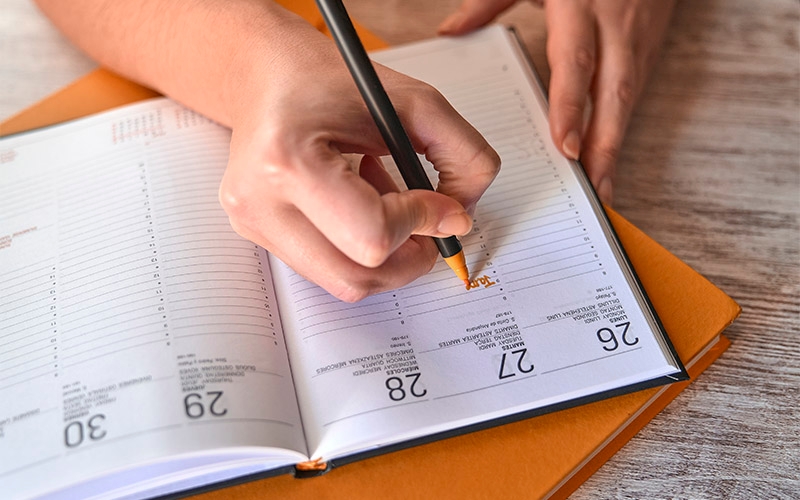Effective ways to stay organized at work: Transform your day


By Becka Martinez
Estimated reading time: 3 minutes
Staying organized at work can greatly improve productivity and reduce stress. When you have a clear and structured approach to your tasks, it becomes easier to manage your workload and meet your deadlines.
Here are my 10 effective ways to stay organized at work to help you keep everything in order and create a more streamlined process.
10 organization tips for work
1. Create a weekly to-do list.
At the beginning of each week, check your calendar for any meetings you need to prepare for and deadlines you must meet. This will give you a framework of your time commitments for the week.
Then, take 10 minutes to write down what projects you need to focus on that week. Setting clear priorities will help you navigate your busy schedule more effectively.
2. Break projects down into smaller tasks.
Large projects can be daunting. Break them down into smaller, more manageable tasks you can complete throughout the week to make them more achievable.
Start by:
- Figuring out which projects are most urgent so you tackle those first.
- Outlining the overall goal, objectives and deadline for each project.
- Identifying major components required to complete each project.
- Dividing major components into smaller, more manageable subtasks.
- Setting realistic deadlines for when each task should be finished.
3. Use a planner.
A physical or digital planner will help you stay organized and keep track of your schedule. You can use it to map out your:
- Daily tasks.
- Deadlines.
- Meetings.
Review your planner regularly to stay on top of your commitments. Be prepared to reprioritize your workload if new, more time sensitive projects or meetings come up.
4. Allocate time to work on your projects.
Block off time in your digital calendar to work on important projects. This will ensure no one schedules a meeting during that time.
If possible, I recommend blocking time during your most productive hours to help maximize your efficiency. The amount of time you need to block will depend on the project you have to get done, but one or two hours is usually a good starting point.
Be sure to hold yourself accountable for getting work done during this scheduled time. It’s easy to push projects off, but it’s important to prioritize your tasks and commit to completing them within the designated time blocks so you can achieve your goals.
5. Minimize distractions.
It’s best to avoid interruptions when you’re working on a project or attending a meeting.
To stay focused, activate the 'do not disturb' mode on your email, phone and work communication channels. This will allow you to devote your full attention to the task at hand.
6. Build flex time into your schedule.
Incorporating an hour of buffer time into your daily schedule is a great way to make sure you check off all the items on your to-do list.
It gives you extra time to manage unexpected situations, such as meetings that go longer than expected or projects that require more time to complete, without having to push back your original deadlines.
7. Be consistent.
A well-established routine brings structure to your workday and helps you develop habits that make it easier to stay organized. It also reduces decision fatigue, as following a set schedule means you spend less time figuring out what to do next.
Outline specific time periods for when you will complete your everyday tasks such as:
- Checking and responding to emails.
- Working on projects.
- Preparing for routine meetings.
- Taking a lunch break.
Be sure to adjust your routine as needed to accommodate changes in workload or priorities.
8. Spruce up your workspace.
A clutter-free workspace improves your focus and creativity. When your desk is organized, your mind can function more efficiently without the distraction of unnecessary items.
You can maintain a tidy workspace by:
- Using organizers and shelves.
- Clearing out items you don’t need or use.
- Cleaning your desk once a week.
9. Optimize your digital workspace.
A well-organized digital workspace is just as important as a physical one.
Keep your computer free of clutter and make things easier to find by:
- Deleting or archiving old files and emails.
- Categorizing digital files into folders.
- Using cloud storage to back up your documents.
10. Review your checklist.
Regularly reviewing your checklist is essential to staying on track and ensuring that all tasks are completed on time.
Set aside a few minutes at the end of each day to go through your checklist. You want t:
- Evaluate your progress.
- Check off completed tasks.
- Move any pending items to the next day.
This practice keeps you organized and ensures no task falls through the cracks.
Supercharge your energy at work.

Becka has been with Schneider since 2013 and has held multiple roles within Schneider Transportation Management (STM), including Broker, Senior Broker and Dallas STM Recruiter. In her current role, Corporate Recruiting Manager, she oversees a team of corporate recruiters. Becka’s favorite part of her day is when she gets to connect quality candidates to positions that will allow for success both personally and professionally.



